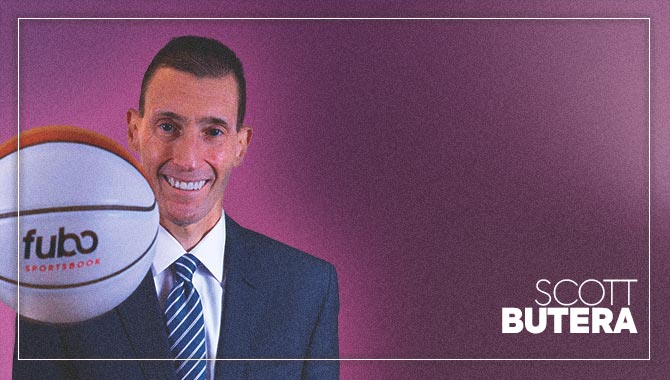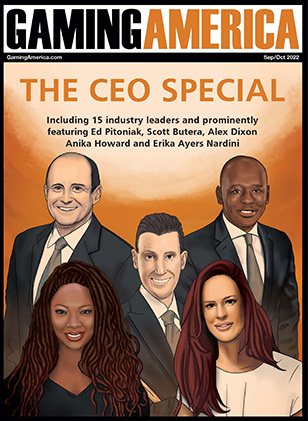
Sports has always been important in the narrative of Scott Butera, the current president of Fubo Gaming, which is the betting arm of the fast-growing streaming platform, FuboTV. Before everything, he was just a fan. Butera hails from Boston, Massachusetts, one of the most infamous towns in the annals of American fandom. His allegiances were tested at a young age, when his father’s job saw the family relocate to southern Connecticut, firmly in the sphere of the formidable New York teams:
“So I lived the Boston-New York rivalry in enemy territory, and, being a huge sports fan at a time when New York typically beat Boston, this was a terrible thing.”
For him, fandom led seamlessly to participation. He would matriculate to Trinity College in Hartford, CT, where he joined the football team. While his size today might belie the fact, in college Butera was defensive end, one of the more physically demanding positions in a game filled with them.
But it is the lessons from being an athlete that are truly applicable to his current role as the steward of Fubo Gaming: “What you really learn is teamwork, camaraderie and sacrifice for the greater good in a very special way... Similarly, in business you have to see that the company always wins. I’ve always done that. [In sports] you learn that you only accomplish things through hard work. Wins and losses are not decided on the playing field, they’re decided in the gym, in training sessions and practice.”
Prior to getting into gaming, Butera was on the more traditional Wall Street track. By the time he had finished at Trinity and received his MBA from New York University School of Business, the go-go eighties were in full swing and, from just two miles south of NYU’s Greenwich Village campus, the center of the financial universe was beckoning. In these formative years of his career, he moved around some of the leading investment banks of the industry – Bear Stearns, Citi Group, Credit Suisse/First Boston and UBS – working with and among legends of Wall Street, such as Ace Greenberg and Jamie Dimon.
As an investment banker, Butera’s specialty became real estate deals: lodging, leisure, consumer facing operations and “of course,” casinos. These were interesting years on the Street, ones in which there was a lot to learn for a hungry young banker. “It was banking in some tougher times,” he explains, comparing it to the situation we are faced with today. “There were a lot of companies that weren’t doing so well, were failing, and financing was difficult. As a result, I got involved with a lot of tricky deals, and that taught me a lot about operations.”
There were a few lessons that Butera would keep from his time on Wall Street. Perhaps taking the page out of his experience as a football player, he learned how to think strategically about business: “What can you accomplish in your market given your talents and resources,” as he puts it. He learned, too, that his ideal role would be a managerial one: “After having been in banking for fourteen years, I realized I liked business, I liked operations, I liked working with customers and I liked working with employees.”
But it was the skillset with which he emerged from the world of investment banking that was to define the next chapter in his career. While working on on Wall Street, he developed a reputation as a go-to person for restructuring, for turning around failing companies and setting them down the right road.
“Because I had a very strong restructuring background, it gave me an edge getting a job at companies that needed to be turned around.”
With these lessons and insights, he moved on to the next phase of his career: a manager of distressed casino companies.
Casinos appealed to Butera as businesses. They are complicated and multi-faceted in a way that other sectors are not. Not only is it the gaming floor, it is also the hotel, the resort, the food and beverage, the entertainment. It is all the ancillary problems that come with uniting many things under one roof. And it was this synergy between component parts that drew in Butera:
“All of those businesses on their own – casinos, restaurants, hotels – they’re all very tough businesses to operate. They’re low margin, grind businesses. But when you get them together, they feed off of each other and create something that’s really economically superior.”
With this abiding interest in casinos and a knack for turning around companies, he first trained his sights on none other than Trump Entertainment Resorts, the casino company – which included three locations in Atlantic City and one in Indiana – owned by the man who would go on to become the 45th President of the United States.
Donald Trump's company was in a slightly distressed state, and Butera joined as COO and President in 2003 to aid with the restructuring. Under the terms of the deal, Trump would have to reduce his majority stock ownership position of 56% down to 27%; bondholders at the company would have to exchange some of their securities for stock; finally, Morgan Stanley agreed to finance the restructuring to the tune of $500m. In 2004, Trump Entertainment Resorts was able to file for bankruptcy.
Butera pointed out that there were certain problems ancillary to a restructuring from which he was able to derive lessons. He pointed to the importance of maintaining a public image of success at the same time as a restructuring: “This was right when The Apprentice was launching, so we had to go through a very difficult deal at a time when NBC was promoting Donald as a very prominent business man. We had to make sure the messaging was correct. I learned a lot about PR.“
He and his team were able to smoothe out some of the edges. They would say that Donald’s turning the property around, that he’s going to take care of things; they didn’t call it a restructuring but, rather, a recapitalization. All that being said and done, “Unfortunately, we did a deal where we essentially wiped out about $3bn of debt, and in order to do that, we had to file bankruptcy. I wish they had another word for that.”
Still, the lesson wasn’t lost on Butera. He had faced down a difficult task and emerged victorious: “If you think you have a shot and you want to create a name for yourself, if you take something that people think you can’t do, and then you actually pull it off, it can be a great moment in your career.”
From there the pattern was set. Following his experience in the orbit of Trump, Butera’s career would move from strength to strength: a year as COO of The Cosmopolitan Las Vegas, two years as President and CEO of Tropicana Entertainment Inc., four years as President and CEO of Foxwoods Resort Casino. The former athlete found his way back into the world of sports, becoming commissioner of the Arena Football League for three years. One of his last roles before entering the world of Fubo was in 2018, when he became President of Interactive Gaming for MGM Resorts International. Here he was tasked with brokering the deal between it and Entain, the European juggernaut. This partnership created BetMGM, which today is consistently ranked among the most popular digital sports books and casinos in the country.
But sports still beckoned, and it arrived in the name of Fubo. With over 100 channels and 50,000 events annually, FuboTV, which launched in 2015, is one of the largest sports streaming platform in the market. With the rise of sports betting in the country, FuboTV saw an opportunity: an integrated sports book and streaming platform.
“I talked a lot about the casino analogy, where you bring a lot of things together and create something special. Basically, this like doing that in the digital world.”
Times have changed, and there are hurdles that sports entertainment companies must jump to stay relevant. People don’t want to just sit and watch sports, like they did in the old days. They want to be involved, to be in on the action. With this approach the number of bettors is expected to multiply: “We are not a sportsbook, we are a media company that incorporates sports betting to make a great media experience. Our idea is to draw from our pool of active subscribers and convert them to sports bettors. If people watch a lot of sports, they tend to bet on sports.”

